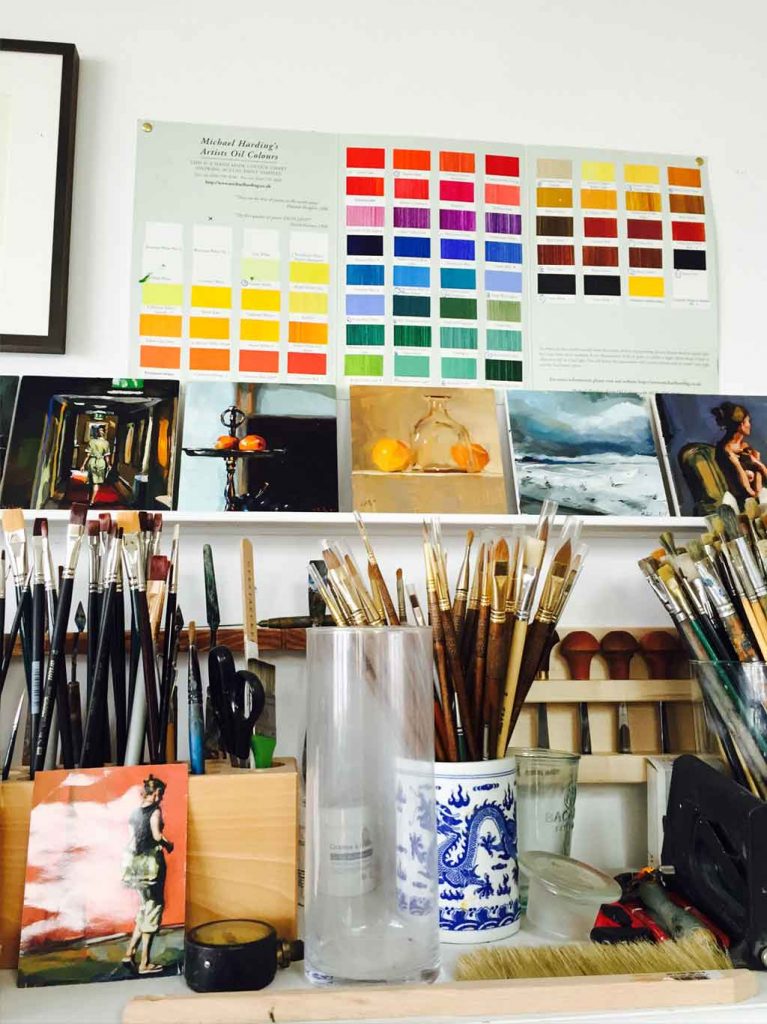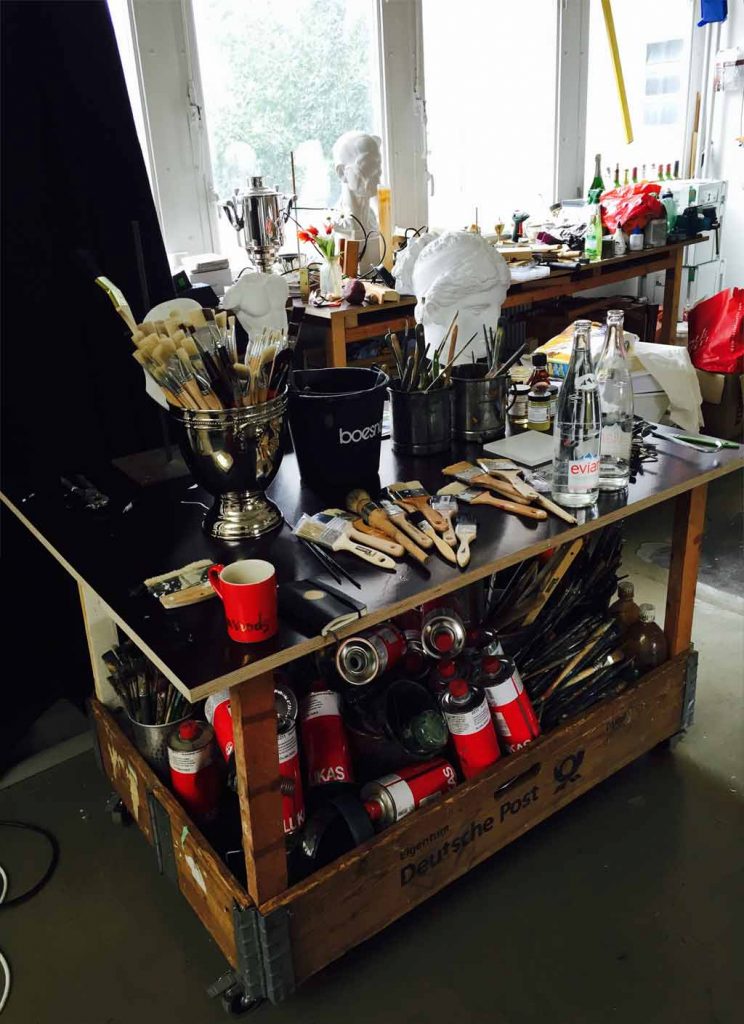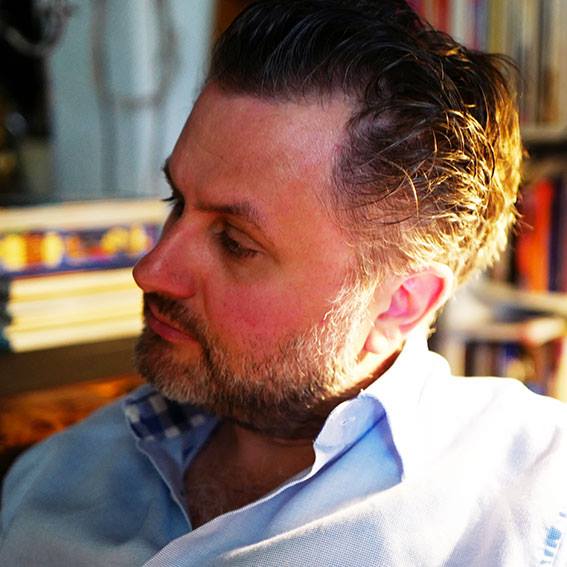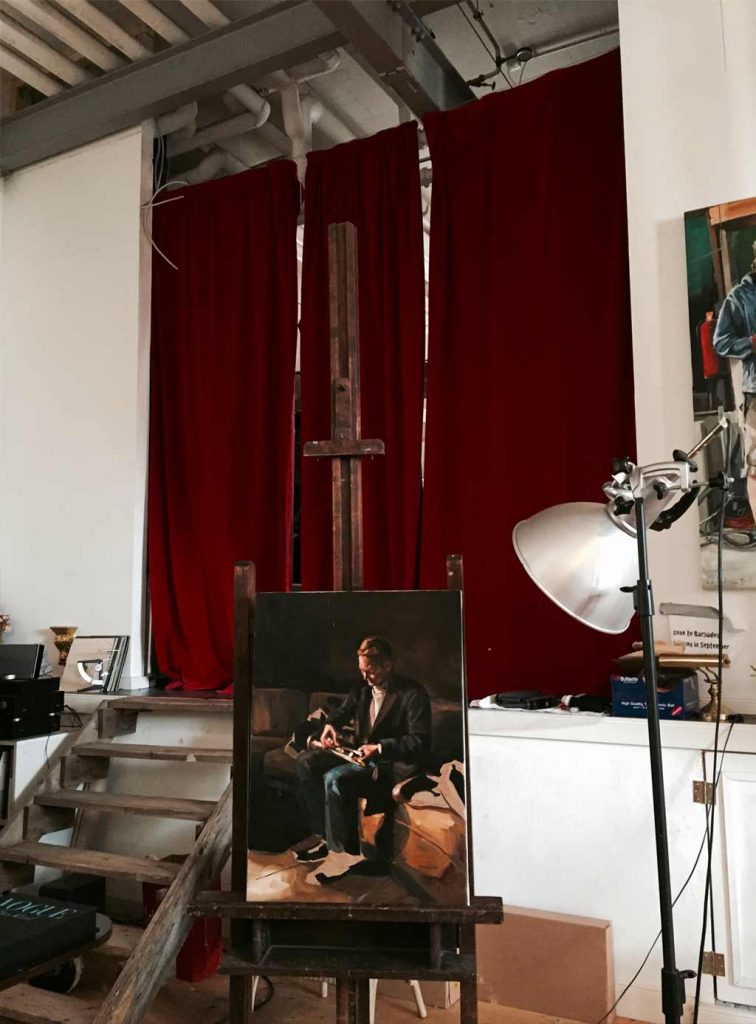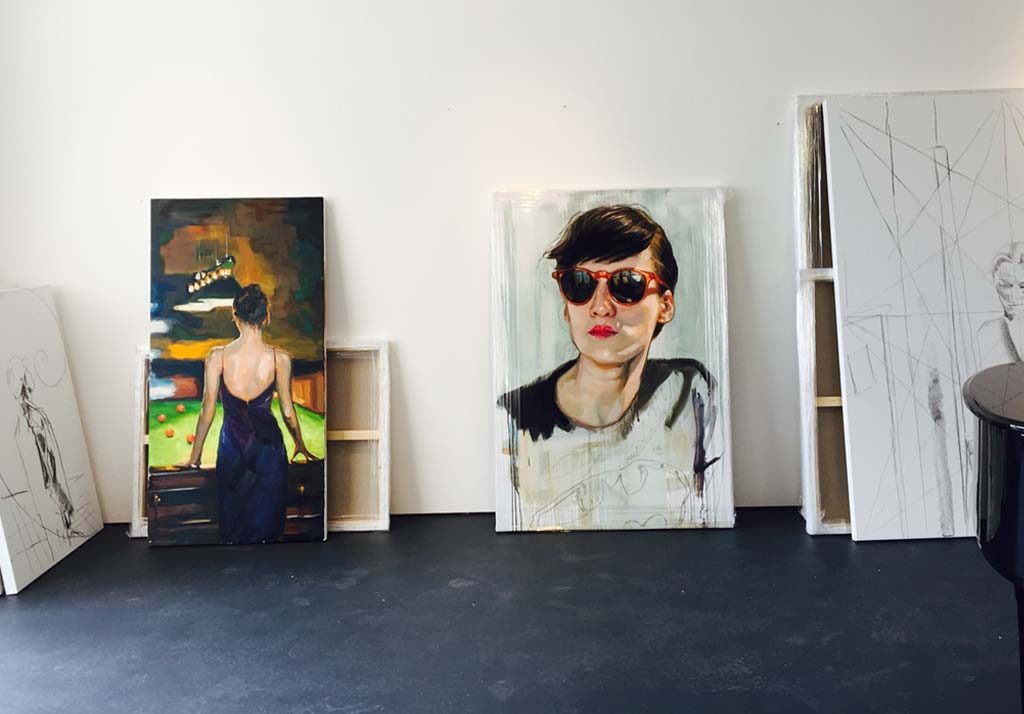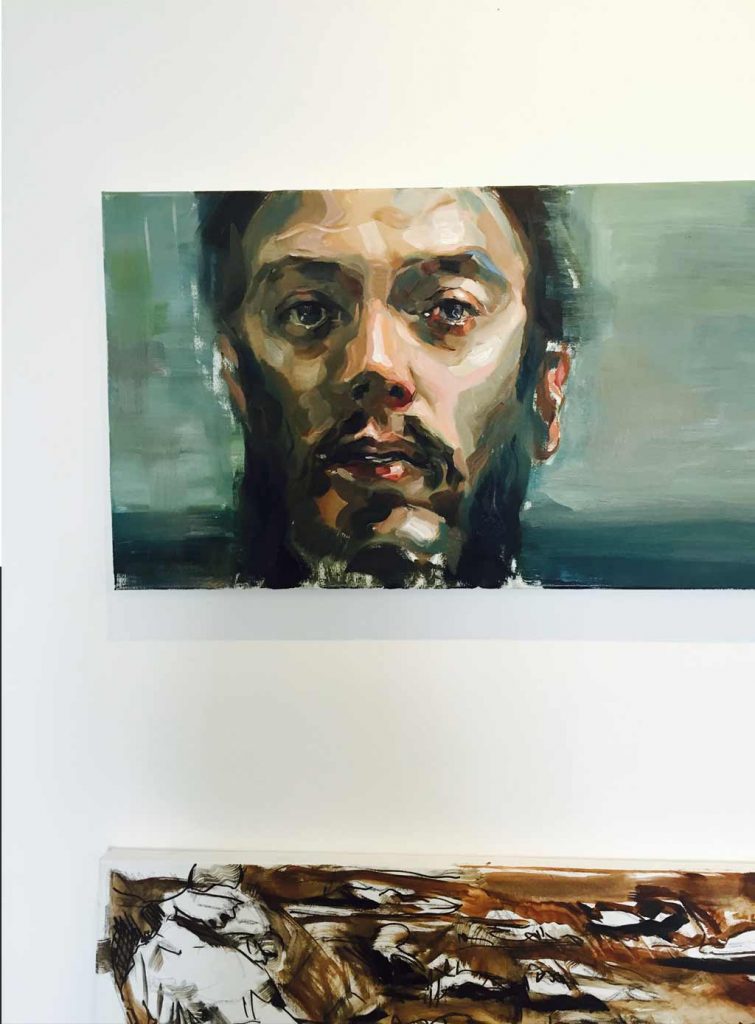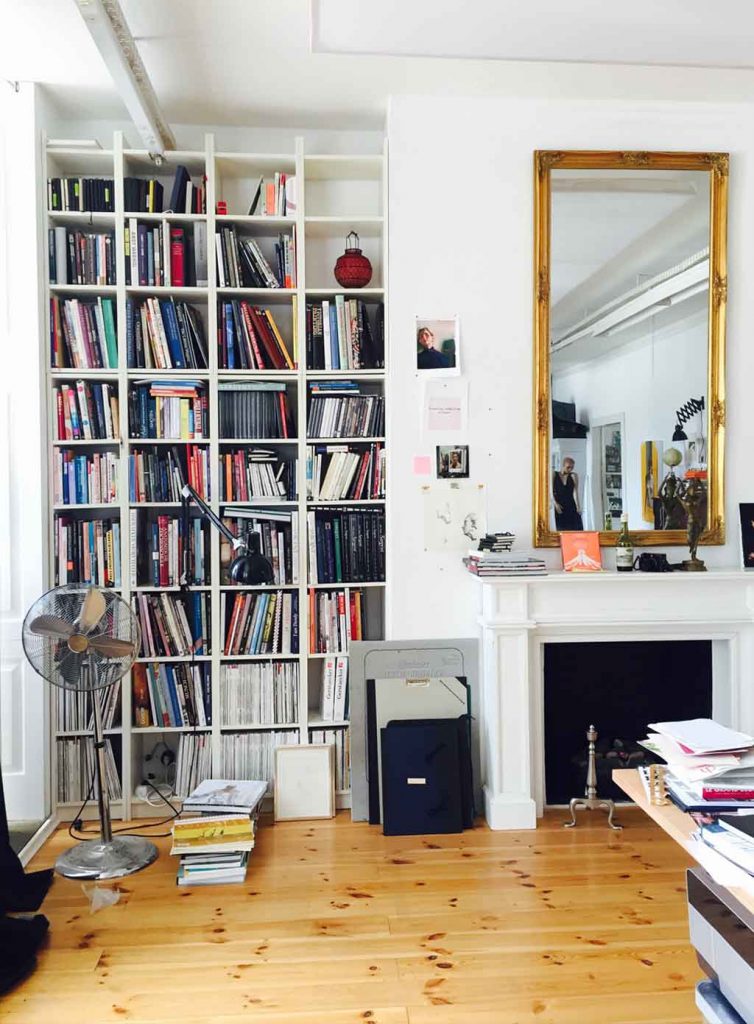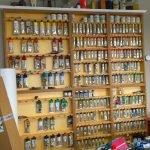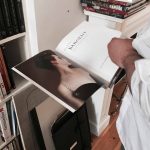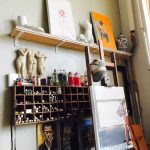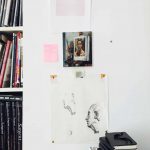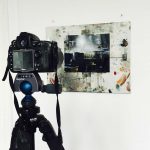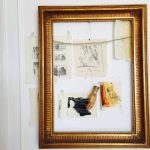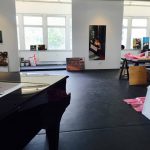Photos by Rawaa Talass
You need to be quite stubborn and single-minded. Nobody thinks you’re any good and secretly you know that you’re not any good. You pretend to be the best because you have to have that confidence. It can be very lonely when you do something nobody else really understands.
Edward B. Gordon is a German-born painter based between Berlin and London. While London remains his spiritual home, Gordon spends most of his time in the German capital, inspired by its everyday life, where he observes and paints intimate moments of the day.
In late 2006, Gordon launched an online blog “A Painting A Day,” in which he would post one painting (sized 15 x 15 cm) per day that would be auctioned off every evening. He has become rather well known for this particular practice and was once described as “Germany’s first and only ‘daily painter’”.
Ever since he started his blog, Gordon has created more than 3,000 daily paintings that have impressively found homes all over the world, from North America & Europe to the Middle East and beyond.
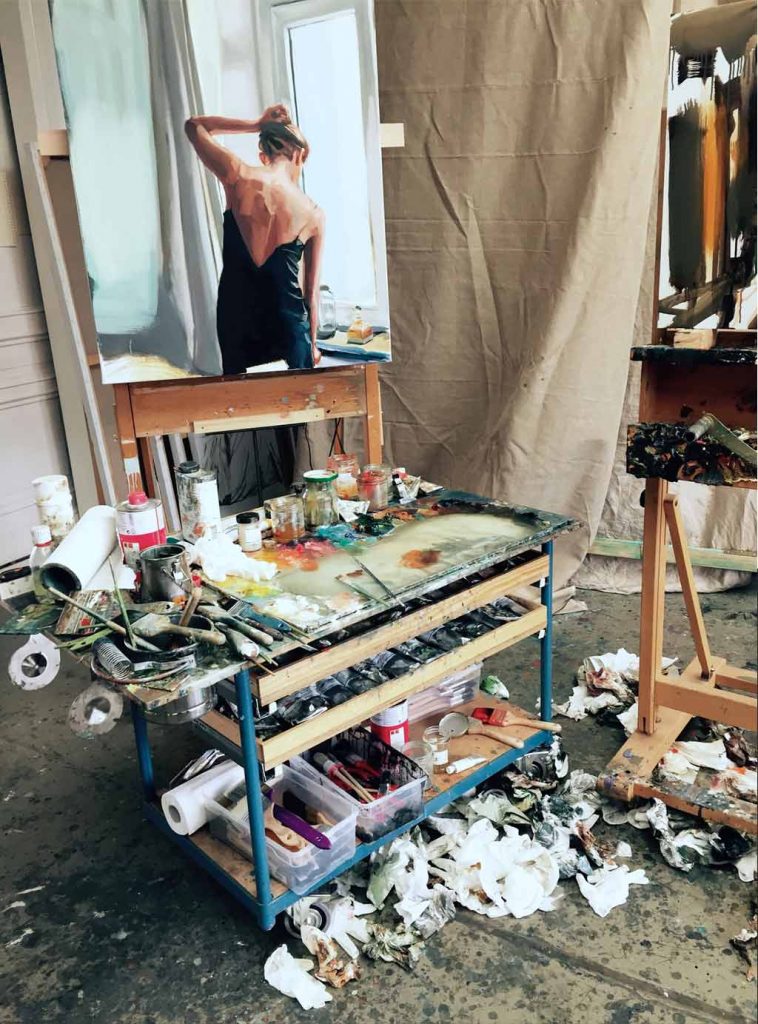
Gordon’s paintings have been widely featured in the German press, such as Die Welt, FAZ.NET – Frankfurter Allgemeine Zeitung, Berliner Morgenpost , Berliner Zeitung, DW – Euromaxx, Cicero, DUMMY MAGAZIN and ZEITmagazin. In recent years, Gordon’s works have been exhibited in contemporary art spaces, most notably the worldwide editions of LUMAS and Pavlov’s Dog in Berlin. Furthermore, the Zurich-based publishing house KEIN & ABER VERLAG has published two monographs, “Painting Berlin” and “Day and Night”, which explore Gordon’s works and philosophies.
On a cloudy morning, I joined Gordon in his Berlin studio to discuss his diverse artistic influences, Berlin’s natural light, the concepts of discipline and talent and much more. Here’s our arresting conversation:
1. Which art movement fascinates you the most?
A: I can’t really say, it would sort of be too final. What I don’t like about art movements is that they are restricting. The one day it starts to become a movement, it becomes limited and I always think the greatest joy in art is that you have complete freedom to do whatever you like.
But I find all art quite interesting and fascinating. The only thing I don’t like if it’s done badly.
2: Who was the first artist that made an impact on you?
A: John Singer Sargent. I grew up in a studio, my mother was a painter and my father was a sculptor. I was born in the sixties and all the friends of my parents were painters or architects.
I still remember that somehow we had an art magazine and [in it] there was a painting by Sargent and I thought, “Wow, now that is painting!” Then I got thinking that painting might be a profession.
3: What is your definition of art?
A: Art has to move me; it has to speak to me. It’s not an intellectual thing. It needs to be a view on the world as we know it, with this little bit of extra that you think, ‘I’ve seen this many times but now somebody translates this with colors and it looks completely new’, a fresh look of the world, a state of wonder – that kind of magic.
“More art and less business!” – says Edward when asked what he’d like to change about the art world.
4: If you could own any artwork, which one would it be?
A: I would like to own a Lucian Freud. He made me actually decide to become a painter. I studied in London at a drama school and I’d seen a real Lucian Freud and it moved me.
His style of painting is not really my aesthetics but it moves me. There is such a brutal force in his painting. You just stand there in front of his work and it’s like something hits you.
5: Most of your paintings are inspired by Berlin’s daily life. What is it about this city that captivates you?
A: Well really, it’s the city’s light. It’s like you have very quick changes of light and they can transform very ordinary places into something magical. It used to be more interesting because you had the former east part of Berlin before all the houses were done up. You would have rows of grey houses.
I always start more or less with a grey canvas and when you have the sunlight, you have real magic because the sunlight can really do the painting on the houses because there was no color distortion.
So, you had mind-blowing pictures made just out of sunlight or the absence of light. Now, of course you have all the houses are made up, it’s all pretty nice. So the light hasn’t got any more of that impact because there’s so much man-made color.
When I first came to Berlin, I found that to be quite fascinating. It was an exciting time, especially visually.
“John Singer Sargent, Lucian Freud, and why not Damien Hirst [just to make it a bit exotic]” – Edward’s 3 art dinner party guests.
6: In the introduction of your book “Painting Berlin” you mention the ‘struggle’ of being a self-taught painter. Tell us about that.
A: Yes, to put it bluntly, it isn’t a good idea to be a self-taught painter. It is actually the worst thing one can do. If you start as a painter and you have a good teacher, then that’s the best way. But, it didn’t work like this for me because I wasn’t really conscious to become a painter.
I wanted to be an actor, I just wanted to be different than my parents. Painting wasn’t something special for me; it was just a way to spend time. It was only later in my twenties that I actually wanted to be a painter.
My advice to a young painter would be to get a good teacher, because it will save time, trouble and money.
The same thing goes with materials – if you don’t have the money for good materials, get yourself a job, get money and buy the best materials. If you’re a student, you must work with the best materials because you need to learn the potential of the materials.
You need to be quite stubborn and single-minded. Nobody thinks you’re any good and secretly you know that you’re not any good. You pretend to be the best because you have to have that confidence. It can be very lonely when you do something nobody else really understands.
Talent is nice to have, but it’s not necessary. You need stamina – the will to succeed and move on against all obstacles and people who say ‘why don’t you get a proper job?’
7: You also mention that your parents “introduced me to the world of art while I was still in my cradle.” Can you elaborate?
A: My parents were at that time very unconventional, we didn’t really have a flat, we had a studio. And I was near things like a bottle of turpentine or my father’s chainsaw. It was quite wild.
In today’s age of health and safety, I probably would’ve been taken away from them. But in the end, it worked out.
8: It seems like you were really guided by them.
A: Yes, well you see, it was sort of a natural thing. Of course when you hear from one of your fellow students at school that their parent was a firefighter, you thought how glorious that was. It was much more interesting than my father who was making things out of wood — how weird was that?
But, art was never something exotic or strange. It was just the normal thing done in my house.
9: You go to your studio every day to paint; you’re very disciplined, as others have noticed.
A: To paint everyday a painting is for me a wonderful discipline because there are days where I just don’t feel like it. You know, you have a bad day or a headache or a row. But at the end of the day you think that’s your private life – so you should forget that, go to your studio, close the door and think that now you are a painter, maybe even an artist one day. It’s so profoundly amazing that for the next eight hours I live in my own world. No matter what happens outside, I’m now ruling over my little universe.
People say to me, “Oh, you don’t make a holiday!” I don’t need a holiday, I have a holiday everyday in my studio from the real life, and that’s very refreshing… I made a choice, it’s not like somebody forced me. It’s my choice to be a good painter and I work on that everyday.
“Overrated (it’s the most un-German city), interesting, wonderful light,” – Edward describes Berlin in 3 words.
10: The internet has really helped you in spreading your art to people from all over the world. I wonder if there is a downside of dealing with the Internet?
A: It’s a bit tricky. Of course you have copyright infringement issues, which happens everyday. I somehow gave up because I thought that if other artists are so little and have nothing better to do than to copy one’s work then I pity them because that’s the whole joy of being a painter, to do something your own way. If one just copies others’ work then what a boring way to spend the day.
11: Finally, what advice would you give to aspiring painters?
A: Work, work, work, work. Try to find a financial back up so that you can work in peace and that you’re not in the position to immediately have to sell your things or do an exhibition. I always compared with a music student— no music student in the beginning would book the Carnegie Hall to give a concert. It often happens with painters, who say, “I must work for an exhibition,” but they don’t have anything to show, they need to learn and not think about exhibitions.
What I would advise is work for 10 years and don’t show anyone, because otherwise if you do something and you show it, you get criticized and you get insecure or stubborn.
It’s like being treated like a small child, save it from the outside world for as long as you can. Give it room, give it time to develop and grow up a bit and not push it into the horrible world straight away. In the end, good art is something timeless — you can’t rush it, it’s there to last.
If you want to be a painter, you have to think long-term. You must be prepared to lead a very lonely life because most of the time you are alone. You work on a painting hours after hours without seeing much progress sometimes. If you’re not strong enough to cope with that, it’s not a good way to spend your life.
Edward B. Gordon’s website: www.edwardbgordon.blogspot.com
Edward B. Gordon’s publications: http://www.amazon.com/Edward-B.-Go…/…/ref=sr_ntt_srch_lnk_1…

[hr]



